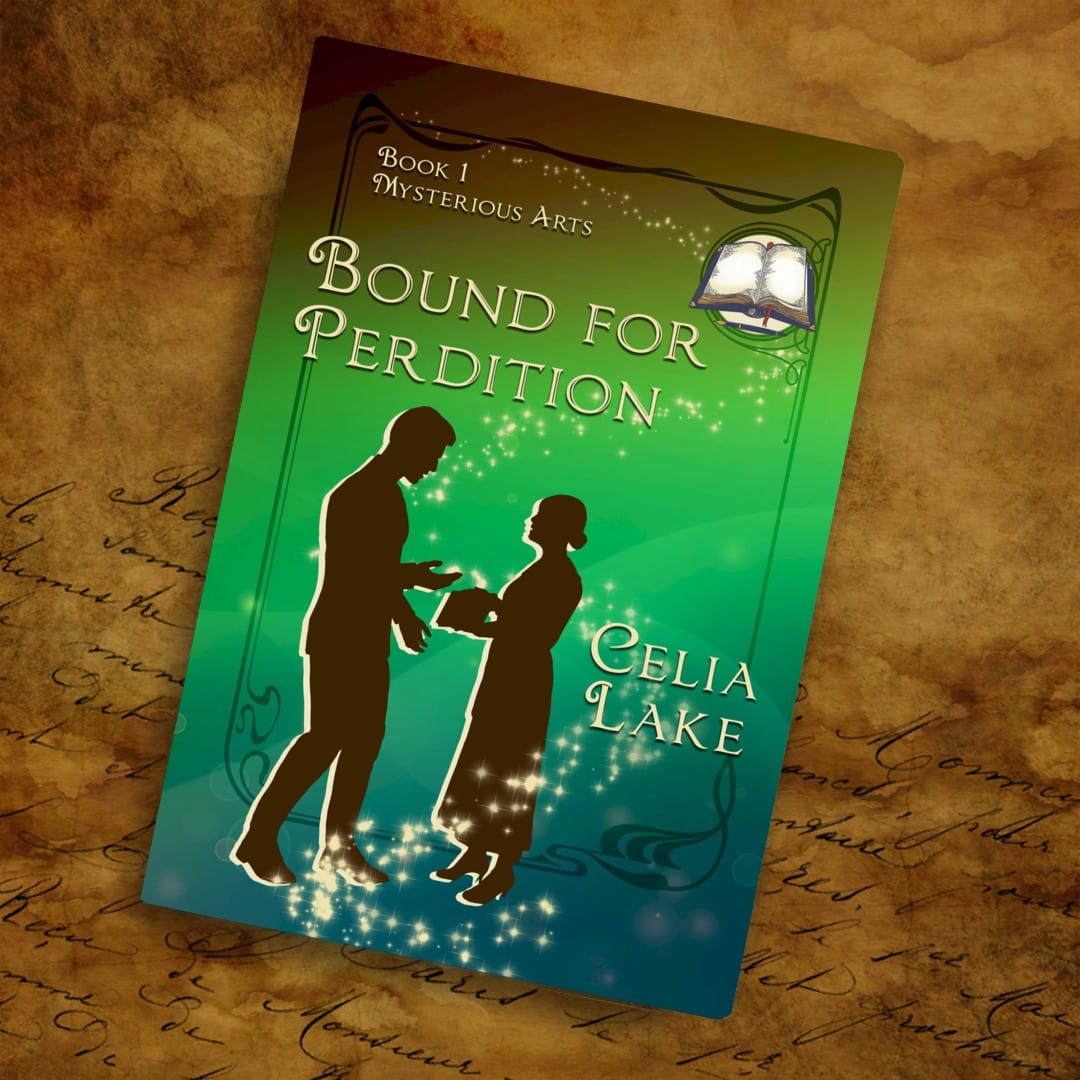I’m amused that this Idea to Book post, about a book in 1917, comes right after the one for Three Graces, the other end of that story. Welcome to the post about Bound for Perdition, a romance about book binding, the early steps in a fatal mystery, and the consequences of new technologies.

The arts
The first thing I wanted to do was a series about magic and various fine and applied arts. This series explores a wide range, and I’m fairly sure what all of them will be now, even though I’m only just about to start writing book 5 in the series in May. For the record, we have:
- Bound for Perdition : Book binding.
- Shoemaker’s Wife : Shoemaking and theatre, with a side of apothecary work.
- Perfect Accord : Alchemical perfumes.
- Facets of the Bench : Jet carving, jewellery, and talismans (coming in August).
- Weaving : this is the one I’m starting to write in May 2024
- Singing, definitely including a nightclub.
- Brewing and use of plants and herbs, alchemical and otherwise.
The journals
The first part of why I wanted to write this book was the journals. The magical journals were invented during the Great War in Albion. Initially, thes a method of providing far more accurate and speedy communication in the magical community. They were available in limited quantities through during the War. After the War, they were more generally available – assuming you could pay for them.
The basic idea, as explored in Bound for Perdition, is that the bound journals are linked magically, allowing you to flow text in an ongoing conversation with different people. Each book can maintain a number of conversations, just under two hundred in a given journal. Lengthy conversations do require additional magic to index and bookmark particular points. Otherwise you lose track of where that particular part of the conversation was.
(If this feels rather like trying to find a conversation you half remember on Tumblr, Discord, the former Twitter, or other social media, well, yes. I’ve been in various online spaces for a long time now. This is a problem that has frustrated me for all that time. Even if I do now have some tools to manage it in a way that works for my brain.)
The implications of the journals
One key issue with the journals is that they are time-intensive and expensive to produce. Once it gets into the 1920s, a journal is roughly the same cost range a newer automobile would be for us. It’s certainly something a number of people own. But for most of us it’s absolutely not a casual purchase, and lots people won’t have. In the late 20s, the costs start coming down. By the mid-30s, the cost is more like a higher end computer. That’s a lot more reasonable for, say, an employer to provide to key staff.
Some professions make them fairly routine quite quickly. The Guard, for example, has shared journals that link the various places Guards are stationed around Albion, and connecting to someone who maintains a central journal, as a method of getting help out quickly when needed. In contrast, there are fewer at the Temple of Healing in the late teens and through the twenties. There, it’s easier and cheaper to have someone run a message by hand to someone else in the same complex of buildings.
Related tools
There are some alternatives. In The Magic of Four, out in May, Leo Fortier explicitly doesn’t have a journal yet. (He’s 14, and explains one of the specific reasons he hasn’t wanted one.) Instead, his family has a set of blood-linked journals that allow him to communicate with a small number of people, the same way as a journal. This is a tad awkward if you want to communicate with different sets of people. But for that use, it works pretty well for them.
Finally, journals have some security measures, but they’re not perfect. For things that absolutely need privacy, a note (with charms to confirm the sender and only open for the intended recipient) are still safer.
The art of bookbinding
More than all of these details, though, I really wanted to explore the joys and delight of the physicality of book binding. As the first book in the Mysterious Arts series, it seemed like a wonderful art to enjoy.
Some of my research involved getting a book-binding kit, in fact. I discovered I loved sewing signatures together rather a lot. However, I also learned that my usual dexterity levels aren’t great for some of the more delicate bits of gluing things in place.
Temple and Delphina Carillon
As I talked about in Three Graces, that book is one end of a longstanding mystery. Bound for Perdition is the first piece of that mystery. While the actual cause of Temple and Delphina’s deaths doesn’t come up directly here, the events are critical to that later arc.
Temple has been working on secret projects during the way with a number of people. Some of them are, shall we say, better for him than others. The research during Bound for Perdition isn’t particularly risky – but he’s getting into that territory. That’s especially true as he continues to worry about his younger brother and the ongoing War.
I did enjoy getting the chance to see both of them – and especially Delphina – on page, and getting more of a sense of their personalities.
The consequences of new technology
Finally, this is a book about the consequences of new technology. Technological progress often accelerates in wartime (or when war is imminent). That’s partly because there are different kinds of pressures, but also because there are often shifts in resources. If something could give a significant tactical advantage – and real time communication absolutely counts – it’s worth seeing if you can make that happen.
That explains both the pressure Lynet is under – and the way she’s undermined, in terms of access to needed materia, resources, even staff. One of the things I thought about a lot in writing and editing was who would want journals to be available, and who would want to block them (subtly, perhaps). Obviously, while there’s an advantage, having accurate information about the tremendous losses at the front would be something the people responsible for them would want to hide. And it’s also true that totally free access to communication from active fighting presents a number of security challenges.
(For the curious, the way Albion handles that in the Second World War is done by explicit oaths about what can and can’t be communicated. You can see some of the variations on this in Illusion of a Boar. They use journals for some things, notes for others. Some people can’t keep their journal available because they’re posted with non-magical folks who would notice.)
Curious?
You can get a copy of Bound for Perdition from your favourite source. It’s a great place to jump into my books. And if you like Reggie, he makes a brief appearance in Three Graces.

